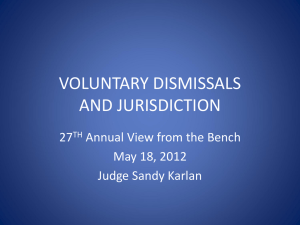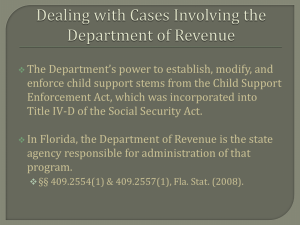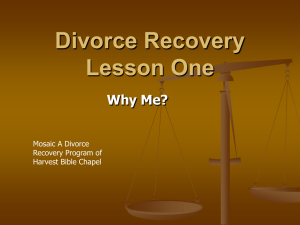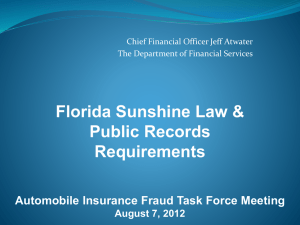Divorce PowerPoint
advertisement
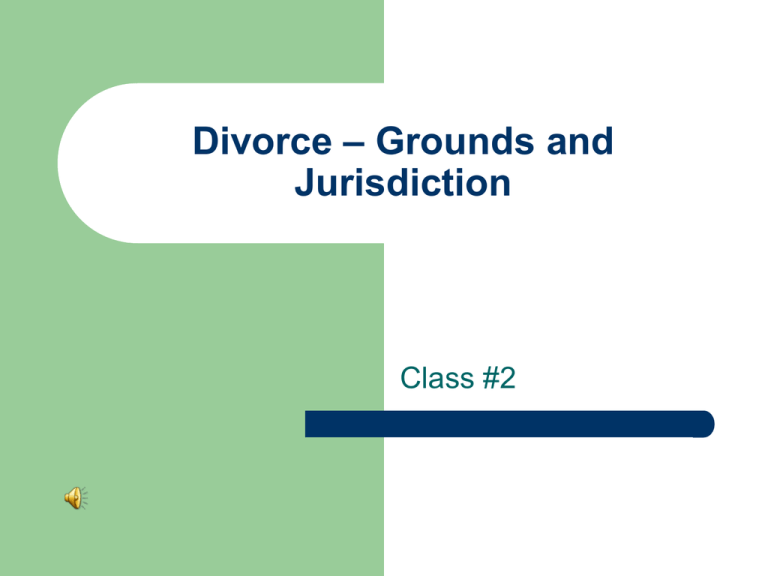
Divorce – Grounds and Jurisdiction Class #2 But first, a little tech advice…. Dear Tech Support: Last year I upgraded from Girlfriend 7.0 to Wife 1.0. I soon noticed that the new program began unexpected child processing that took up a lot of space and valuable resources. In addition, Wife 1.0 installed itself into all other programs and now monitors all other system activity. Applications such as Poker Night 10.3, Football 5.0, Golf 7.5, and Racing 3.6 I can't seem to keep Wife 1.0 in the background while attempting to run my favorite applications. I'm thinking about going back to Girlfriend 7.0, but the uninstall doesn't work on Wife 1.0. Please help! Thanks, A Troubled User …and the response Dear Troubled User: This is a very common problem that men complain about. Many people upgrade from Girlfriend 7.0 to Wife 1.0, thinking that it is just a Utilities and Entertainment program. Wife 1.0 is an OPERATING SYSTEM and is designed by its Creator to run EVERYTHING!!! It is also impossible to delete Wife 1.0 and to return to Girlfriend 7.0. It is impossible to uninstall, or purge the program files from the system once installed. You cannot go back to Girlfriend 7.0 because Wife 1.0 is designed to not allow this. Look in your Wife 1.0 manual under WarningsAlimony-Child Support. I recommend that you keep Wife1.0 and work on improving the situation. I suggest installing the background application "Yes Dear" to alleviate software augmentation. and finally…. The best course of action is to enter the command C:\APOLOGIZE because ultimately you will have to give the APOLOGIZE command before the system will return to normal anyway. Wife 1.0 is a great program, but it tends to be very high maintenance. Wife 1.0 comes with several support programs, such as Clean and Sweep 3.0, Cook It 1.5 and Do Bills 4.2. However, be very careful how you use these programs. Improper use will cause the system to launch the program Nag Nag 9.5. Once this happens, the only way to improve the performance of Wife 1.0 is to purchase additional software. I recommend Flowers 2.1 and Diamonds 5.0 ! WARNING!!! DO NOT, under any circumstances, install Secretary With Short Skirt 3.3. This application is not supported by Wife 1.0 and will cause irreversible damage to the operating system. Grounds for Divorce Traditional (Fault-Based) Grounds No Fault Grounds Traditional (Fault-Based) Grounds Cruelty – The forerunner to no fault divorce Adultery Desertion/Abandonment Cruelty Was often “negotiated” as the ground of choice in the pre-no fault era Even before the “no fault” revolution of the 1970’s, most divorces were uncontested (as to the divorce, not necessarily the financial issues) Remains a ground for divorce in 25 states Adultery Also a crime in many states, but rarely prosecuted criminally Remains a ground for divorce in most states Desertion/Abandonment More common that adultery as a ground, but less so than cruelty Still on the books in 28 states Often there is a duration requirement, typically one year Some states require that the desertion be “unjustified” 1970’s – The No Fault Revolution Was it a “revolution” or was it the legal system catching up with changes already made is society Studies show that the increase in divorce rates preceded no fault laws and have fallen in recent years The so-called “Bible-belt” or red states have a higher divorce rate than the “liberal” blue states What is no fault? “Pure” no-fault – Marital breakdown is only ground for divorce Blended – At least one no fault ground with fault-based grounds still available (but rarely used) No fault grounds Marital breakdown Living separate and apart Incompatibility Marital breakdown Requires testimony from requesting party that the marriage is broken and no chance for reconciliation Includes concept of “irreconcilable differences” Florida has a version of the “marital breakdown” ground for divorce Living separate and apart Unlike desertion, no “justification” for the separation required Period of separation required, often one year – – – – Pursuant to a written agreement Voluntarily and willingly apart No agreement or other conditions required, just separation Separated and proof of marital breakdown Incompatibility Available in only seven states More than petty bickering Requires showing of incompatibility of temperament, a true mismatch of personalities, goals, interests Florida grounds for divorce No judgment of dissolution of marriage shall be granted unless one of the following facts appears, which shall be pleaded generally: (a) The marriage is irretrievably broken. (b) Mental incapacity of one of the parties. F.S.A. § 61.052 Divorce Jurisdiction – “The Divisible Divorce” Separate rules for jurisdiction over: – – – Termination of the marriage Provisions for the children (custody, visitation, child support) Financial concerns (property division, alimony) Jurisdiction to terminate marriage Divorce is not an equitable action, despite notion of equitable distribution or property and many opinions in divorce cases where judges speak of “doing equity.” Authority to grant divorce is purely statutory, as are the jurisdictional requirements Migratory divorce Prior to residency statutes, needed only to be present and prove a ground for divorce Often want to get away from home to someplace warm (yes, Florida was once a divorce haven in the era of migratory divorce) Avoid local notoriety Also avoid financial responsibility for family back home Full Faith and Credit Clause Constitutional requirements for application of full faith and credit as determined by US Supreme Court prompted states to adopt meaningful residency requirements that doomed migratory divorce No state wanted to have a jurisdictional requirement so loose that other states were not obligation to recognize its divorces Williams I Nevada divorces and remarriage, Return to North Carolina and prosecuted/convicted of adultery Held: State of plaintiff’s domicile can grant a divorce which must be given “full faith and credit” by all other states Adultery conviction reversed Williams II Same case, but on remand the N.C. court found that the claim of domicile in Nevada was not supportable. Held: States must give respect for, but are not bound by, another state’s finding that it has sufficient proof of domicile to grant a divorce Adultery conviction affirmed Sherrer Wife from MA comes to FL for divorce H appears in FL also, but does not contest W’s claim of FL domicile H then appeals, claiming FL lacked jurisdiction because W was really a MA resident Held: H had a chance to contest FL domicile, but didn’t, so now he is stuck with it. Period of residency before filing Every state has a statutory minimum period of residency (except Alaska, which requires proof of common law domicile) 6 months is the most common period of residence – Nevada is 6 weeks, hence its reputation as a divorce haven, but only for the wealthy who can afford to stay there for 6 weeks to establish jurisdiction Personal Jurisdiction - Kulko Minimum Contacts with state by defendant Reasonable and fair to require defendant to defend action in state in question Purposeful availment of privileges and protections of the state Defendant’s acts elsewhere caused effects in the state Florida period of residency FL. Stat. §61.021 Residence requirements.-To obtain a dissolution of marriage, one of the parties to the marriage must reside 6 months in the state before the filing of the petition. Subject Matter (In Rem) Jurisdiction over Divorce in Florida Both parties here, or only one? Is six months really six months? Either party can be FL resident Court has jurisdiction to dissolve marriage where either party is a resident of Florida. Loffler v. Loffler, 620 So.2d 1048 (Fla. 1st DCA 1993). Six months need not be continuous Continuous residency in state for six months prior to filing dissolution petition is not required. Residency requires only – actual presence – and the intention at that time to make Florida party's primary residence. – Hunter v. Hunter, 736 So.2d 801 (Fla. 1st DCA 1999); Copas v. Copas, 687 So.2d 885 (Fla. 2d DCA 1997). For example… Short-term vacations outside of Florida during the crucial 6 month residency period will not along defeat subject matter jurisdiction if: – At least six months has passed since initially arriving in Florida before the petition is filed, and – There is the requisite intent starting at the beginning of that 6 month period to permanently reside here But… The court does not have jurisdiction over marriage where evidence did not establish that a wife intended to make Florida her permanent residence six months prior to her filing of the petition. Sragowicz v. Sragowicz, 591 So.2d 1084 (Fla. 3d DCA 1991). “one suitcase” decision What proves intent to reside? Purchase of home Register to vote Driver’s license Bringing belongings Registering children in school Becoming employed Clearly stating an intent to remain Temporary or involuntary absence Temporary and or involuntary absence from the State does not defeat residency requirement. Wade v. Wade, 113 So. 374 (Fla. 1927), Rahal v. Rahal, 861 So. 2d 114 (Fla. 3d DCA 2003), Wetherstein v. Wetherstein, 111 So.2d 292 (Fla. 2d DCA 1959) What types of absence are OK? Military or government service Employment reassignment (if not permanent) Vacation Incarceration in another state Medical treatment elsewhere Key fact to prove if temporarily absent from FL Intent to return to FL after period of absence Did not establish a domicile in another state Challenges to subject matter jurisdiction Lack of subject matter jurisdiction can be raised at any time including for the first time on appeal. But subject matter jurisdiction is a matter of law and cannot be conferred on the court by waiver, agreement or acquiescence. Chapoteau v. Chapoteau, 659 So.2d 1381 (Fla. 3d DCA 1995). What if two states have subject matter jurisdiction? Florida court should decline to exercise jurisdiction of dissolution of marriage action where two courts have concurrent jurisdiction and a prior action has been filed in another state. The first to exercise jurisdiction acquires exclusive jurisdiction under the "principle of priority". Siegel v. Siegel, 575 So.2d. 1267 ( Fla. 1991). Personal Jurisdiction over Divorce in Florida FL. Stat. 48.193: Florida has personal jurisdiction over a defendant if he/she: – maintained a matrimonial domicile in this state at the time of the commencement of this action – resided in this state preceding the commencement of the action, whether cohabiting during that time or not. – This statute does not change the residency requirement contained in §61.021 for filing an action for dissolution of marriage. Long arm jurisdiction FL. Stat. 48.194: Personal service outside the United States: Service of process on persons outside the United States may be required to conform to the provisions of the Hague Convention on the Service Abroad of Judicial and Extrajudicial Documents in Civil or Commercial matters. To effect service of process under the Long Arm Statute, specific allegations demonstrating the jurisdictional facts must be alleged. Weiler v. Weiler, 861 So. 2d 472 (Fla. 5th DCA 2003), McMahan v. McMahan, 826 So. 2d 1024 (Fla. 3d DCA 2001). Challenges to personal jurisdiction Where parties raise jurisdictional issues, evidentiary hearing is required. Weiler v. Weiler, 861 So. 2d 472 (Fla. 5th DCA 2003), Anechiarico v. Thompson, 596 So.2d 514 ( Fla. 4th DCA 1998). When jurisdictional allegations of pleading are controverted by affidavit, the burden shifts to petitioner to establish jurisdiction. Passy v. Lewis, 553 So.2d 223 (Fla. 1st DCA 1989). Lack of jurisdiction A Final Judgment entered without personal jurisdiction is void ab initio. Anderson v. Anderson, 845 So. 2d 307 (Fla. 2d DCA 2003). Death of a party prior to rendition of final judgment divests court of jurisdiction. MacLeod v. Hog 654 So.2d 1250 (Fla. 2d DCA 1995). Federal Jurisdiction? Doctrine of abstention by federal courts in domestic relations matters Exception to federal diversity jurisdiction The whole subject of the domestic relations of husband and wife, parent and child, belongs to the laws of the states and not to the laws of the United States Exceptions to Abstention Doctrine Tort suits stemming from custody and visitation disputes Enforcement of divorce judgments if the question does not require the federal court to address core domestic relations issues Other times where the “dirty work” of family law has already been done by the state court
